In 2024, the National Highway Traffic Safety Administration fined Ford $165 million for dragging its feet on recalling faulty rearview cameras and failing to report the defect. That massive penalty is a reminder of something most drivers forget just because there’s a recall doesn’t mean your safety worries are over.
Even if automakers repair acknowledged defects, constant and stubborn breakdowns not to mention patch jobs can leave motorists with expensive, hazardous vehicles. That’s when lemon law is the real safety net.
The Recall That Caught Fire
The recall affected more than 600,000 Ford vehicles, including popular models like the F-150, Mustang, Escape, Ranger, Expedition, and several Lincoln models. Their rearview cameras often went blank or showed distorted images, creating real safety risks in a world where drivers rely heavily on technology to avoid collisions.
Ford’s delayed reporting and incomplete disclosures led to a $165 million penalty from federal regulators, with part of the fine directed toward improving safety systems and oversight.
Recalls Doesn’t Mean Warranty Repairs
A recall is intended to protect public safety, while a warranty repair addresses individual vehicle issues. Yet even after a recall, many drivers find themselves returning to the shop for the same problem or dealing with temporary fixes that don’t last. If your car continues to have a defect that affects how it runs, how safe it is, or how much it’s worth, you may be eligible to file a Lemon Law claim.
The Lemon Law gives consumers the power to seek a refund, replacement, or compensation from the manufacturer when traditional repairs fail to solve the problem.
Why This Matters to Owners of Car Owners
Ford continues to top recall and Lemon Law statistics in California. The 2024 recall and resulting penalties have driven many Ford owners to file Lemon Law claims.
General Motors has also seen high recall rates, especially for full-size trucks and SUVs, while Chrysler, Ram, Fiat, and other brands are often linked to powertrain, electrical, and software defects.
Nissan drivers frequently report “phantom braking” and other assist-system malfunctions that dealers can’t seem to fix.
If your vehicle issues go beyond a routine recall, acting quickly under California’s Lemon Law can help protect your rights and reach out to a Ford lemon law attorney.
When to Escalate from Recall to Lemon Lawsuit
This is how to know when it’s time to take a legal action:
- Repeated repair attempts: same defect, same symptom, repeated trips.
- Excessive days out of service: your car is off the road too many days.
- Defect affects safety, use, or value: not cosmetic or minor aggravations.
- Still under original (or certified) warranty: legal relief requests must be within coverage.
- You’ve followed recall instructions: don’t skip the recall repair step, but don’t assume it solves the problem forever.
How a Ford Lemon Law Legal Team Can Help
If you own a Ford or another vehicle brand that has been recalled, repaired, and continues to have the same problems, our Lemon Law attorneys can review your repair history at no cost. They can determine if your vehicle qualifies, work with the manufacturer on your behalf, and take legal action if needed.
We also handle claims involving GM, Nissan, Chrysler, Ram, and Fiat, where recurring defects often overlap with ongoing recalls and unresolved warranty issues.
What This Means for Ford Drivers
Ford’s $165 million penalty serves as a clear reminder that a safety recall doesn’t always mean the problem is solved. For drivers dealing with repeat issues and unreliable repairs, the law provides protection beyond the recall process. If your car continues to have the same defects even after being “fixed,” it may be time to explore your rights under the Lemon Law.
You don’t have to settle for a defective vehicle. Protect yourself and your investment by getting legal help to hold manufacturers accountable.



No Comment